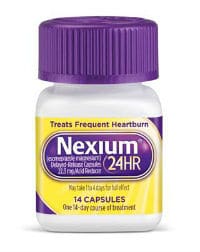
Free Confidential Lawsuit Evaluation: If you or a loved one developed acute interstital nephritis or acute kidney disease after taking Nexium, you should contact our law firm immediately. You may be entitled to compensation by filing a suit against the manufacturer and our lawyers can help.
How Can Nexium Cause Kidney Damage?
Nexium belongs to a group of heartburn medications called proton pump inhibitor (PPIs) that work by preventing the stomach from producing too much acid. PPIs shut off some of the acid producing pumps in the stomach while leaving others to operate normally. This reduction in acid means no more heartburn and less related damage to the esophagus. However, this same mechanism of action can decrease the body’s ability to absorb vital nutrients such as calcium and magnesium.
It is well known that Nexium and other proton pump inhibitors prevent the body from absorbing calcium, resulting in a loss of bone density and increasing the risk of bone fractures. What is less well known is that PPIs block the absorption of magnesium, a vital nutrient needed for the kidneys to function properly. Kidney damage from Nexium typically doesn’t occur overnight — it usually takes at least 3 months before symptoms appear. In the meantime, damage is being done to the kidneys.
Nexium Nephritis Studies
The first case report linking Nexium to interstitial nephritis was published in 1992. Three years later, 2 more case reports were published; in one, a woman who used Nexium required dialysis, in the other, a patient took the drug for only 3 weeks before being diagnosed with nephritis. In April 2015, a study published in CMAJ Open found that older people who started taking proton pump inhibitors were 3 times more likely to develop kidney damage or nephritis compared to similar aged patients who did not take the medications.
FDA Warning & Label Change
In December 2014, the U.S. Food & Drug Administration (FDA) announced that Nexium labels would be updated to include information about the risk of acute interstitial nephritis. The condition causes sudden and severe kidney inflammation, and can occur at any time during treatment with the drug, according to the FDA.
What is Nephritis?
Nephritis is primarily characterized by an inflammation of the kidneys. When this occurs, the kidneys are no longer able to effectively filter the patient’s blood. If nephritis is not treated in a timely manner, the kidneys go into a critical phase and ultimately fail.
To prevent kidney failure, the patient will require dialysis, a procedure that involves performing the functions of the kidneys with the help of a machine. However, even dialysis will ultimately not be enough to save a patient with kidney failure. Eventually, the kidneys will need to be replaced with healthy ones through a kidney transplant.
Types of Nephritis
The medical literature describes nephritis as a collection of symptoms that are associated with disorders that affect the kidneys, especially glomerular disorders. There are different types of nephritis that people can suffer from, including:
- Acute interstitial nephritis (AIN)
- Chronic Nephritis
- Glomerulonephritis
- Primary Glomerulonephritis
- Autoimmune Nephritis
- Lupus Nephritis
- Pyelonephritis
Symptoms
Signs and symptoms of nephritis include:
- Pain in the pelvis
- Pain or a burning sensation while urinating
- Frequent need to urinate
- Cloudy urine
- Blood or pus in the urine
- Pain in the kidney area or abdomen
- Swelling of the body, commonly in the face, legs, and feet
- Vomiting
- Fever
- High blood pressure (hypertension)
- Glomerulonephritis
Treatment
Treatment for nephritis depends on what’s causing the problem. If Nexium is determined to be the likely cause, you may want to consider switching to a medication with fewer potential side effects. However, you should never switch or quit taking a prescription drug without talking to your doctor first.
Other things you can do to help treat nephritis include:
- Limiting salt and fluid in the diet can help improve swelling and high blood pressure.
- Limiting protein intake can help control the accumulation of waste products in the blood (azotemia).
- Corticosteroids or stronger anti-inflammatory medications such as cyclophosphamide can sometimes be helpful.
Do I Have a Nexium Interstitial Nephritis Lawsuit?
The Class Action Litigation Group at our law firm is an experienced team of trial lawyers that focus on the representation of plaintiffs in Nexium lawsuits. We are handling individual litigation nationwide and currently accepting new acute interstitial nephritis cases in all 50 states.
Free Confidential Case Evaluation: Again, if you developed acute interstital nephritis or acute kidney disease after using Nexium, you should contact our law firm immediately. You may be entitled to compensation by filing a suit and we can help.
